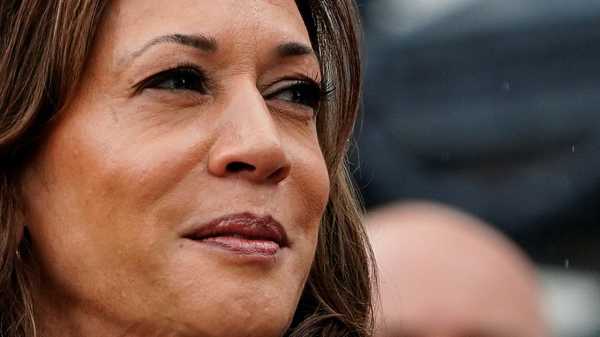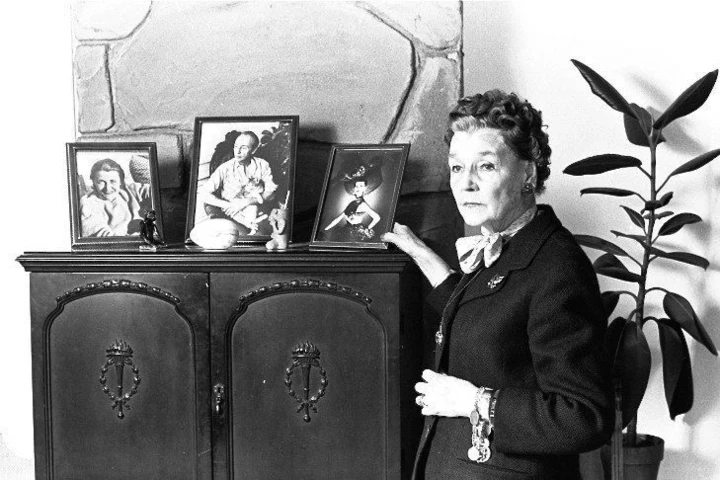
Save this storySave this storySave this storySave this story
What was once known as the Biden Victory Fund raised more than two million dollars on Saturday, at an event held in the liberal haven of Provincetown, on Cape Cod. Maura Healey, the governor of Massachusetts, was there, as was the Secretary of Transportation, Pete Buttigieg; Jennifer Coolidge, Adrienne Warren, and Billy Porter served as pop-culture emissaries. The headliner was Vice-President Kamala Harris. A banner behind her said “VPTOWN.” Back then, which is to say, seventy-two hours ago, she was still a surrogate for President Joe Biden, charged to convince a doubting population of the vitality of his Administration as the reigning head of state sat ill with COVID in his vacation house in Rehoboth Beach, away from public view, in what was both a disaster and a mercy. “In this election, we know what candidate for President puts the American people first—our President, Joe Biden,” she said. People in the crowd were primed to see the event as an audition, even as Harris stayed on message. Afterward, an attendee posted online, “She can go the distance. I am proud of her now; I will be proud if she leads us as President of the United States.”
And now we have it. Harris has officially graduated from limbo. On Sunday afternoon, a day after the Cape Cod fund-raiser, Biden announced that he was ending his reëlection campaign. The announcement was remarkable for many reasons, the most basic being that it was accompanied by no images. There was no emergency press conference from Delaware, generating slapdash pomp. Biden wrote to the people, as if this were another century and he was a mariner gone on a long trip. (Albeit a mariner who knows how to post on social media.) His initial letter, which he published on X, said nothing about who might replace him. This sowed confusion; it seemed that Biden was not endorsing Harris. But a few minutes later, in a separate post, he clarified that he was supporting her candidacy. A couple hours later, Harris posted her own announcement that she was running.
Prior to the fateful debate between Biden and former President Donald Trump in June, the press had cast a dismissive eye on Harris. In October of 2023, she was profiled by the New York Times and The Atlantic; both pieces were lamentations of a political figure who was not inclined to do the performance expected of political figures. The narrative of her Vice-Presidency was seemingly locked in: a stumbling first year marked by high staff turnover, a legendarily bad interview with Lester Holt, a shirking of public presence—“Where is Kamala?” people would ask—and then a resurgence, energized by her furious organizing against the Supreme Court’s overturning of Roe v. Wade. It is on this issue that she outshines Biden, a Catholic, who is reluctant to let the word “abortion” pass his lips. This past spring, Harris visited a Planned Parenthood clinic; it is believed to be the first time that a sitting U.S. President or Vice-President had visited an abortion provider. In April, the Times columnist Charles Blow wrote, of Harris, that “talk of her as a liability” had been hushed, as the post-Roe world wreaked its violence in many states.
This surrogacy period will be retconned as the prelude to Harris’s Presidential campaign. She has gone on sixty trips across the country this year. In July alone, she touched down in New Orleans, Las Vegas, Dallas, Kalamazoo, and Fayetteville. The battleground states have seen her multiple times. Not long after the second anniversary of the Dobbs decision, she sat with Olivia Troye, a former Trump Administration official, and Amanda Stratton, a former Republican voter, in Portage, Michigan, to discuss the G.O.P.’s assault on reproductive care. She couched her advocacy in tempered language, invoking the “rabbi,” “priest,” or “imam” a person might consult when deciding to seek an abortion. “If we, in this Year of Our Lord, 2024, have a state of being where the government can tell you what to do with your body, I mean, the most basic of things you should have control over,” she said, “everybody better watch out about what other freedoms you’re taking for granted.”
Harris’s stump speeches tend to speed past personal mythology. We know choice stories: a young Harris attending civil-rights marches in Oakland; her mother’s koans. The ego is in the career, her near three decades as a prosecutor in post-Crime Bill California. She tries, unconvincingly, to promote the mixed message of her first book, “Smart on Crime,” released in 2009, that she was a proto-progressive prosecutor, a mitigator of the mass-incarceration crisis. Her second book, the political memoir she released in 2019, “The Truths We Hold,” feels written out of obligation, an offering on the altar of the modern American Presidential campaign. She creates a portrait of her mother, Shyamala Gopalan, a feminist cancer researcher who immigrated to America from India, as the designer of her political and moral compass. She writes vaguely of her father, Donald Harris, a Marxist economist from Jamaica, who bestows upon her the race with which she is primarily identified. (In the mind of the American public, Harris’s Blackness wins out; her South Indian ethnicity demoted to a secondary, apolitical category.) Donald is estranged from both Harris and her story, his meaning eclipsed—in her slight biography—by her education at Howard University and her Alpha Kappa Alpha sorority membership.
Anyway, no one has time for biography. A shame, as Harris’s blended family aligns with modern America: she is a stepmother to the children of her spouse, Doug Emhoff; she does not seem to have a relationship to the long-suffering wifedom that plagued even Hillary Clinton. She has repeatedly expressed a loathing for the politician’s “lovely speech,” championing instead her style of get-to-the-marrow argumentation. Harris’s first address, since her presumptive nomination, was given on Monday evening at her campaign headquarters, in Delaware, emphasizing the Bidenian continuity. The acting President called in, sounding hoarse, saying, “I’m watching you kid, I love you.” Harris still spoke like a surrogate for him, giving a highlight reel of his one-term Presidency. The hagiography, which comes not just from Harris, is an obscene kissing of the ring. The political servant is a creature of vanity: Biden willingly held on to power past his capabilities.
The relationship between Biden and Harris is not easily knowable, no matter what the leaks suggest. What we can tell is that there is sometimes an atmosphere of gritted-teeth tolerance. This distance between the two politicians, which could have its origins in Harris’s biting critique, during a 2019 primary debate, of Biden’s alliance with a segregationist, is one that the Harris campaign will surely exploit in the weeks to come. Harris will align herself with Biden’s successes while absenting his failures. The G.O.P. will tag her with the requisite raving racism or misogyny, and weightier broadsides, as in the “border czar” line, the technocrat critique.
The forced brevity of her Presidential campaign is unprecedented. Among the Democrats, the question of whether a Black and South Asian woman can win the Presidency—her electability factor—cannot be quelled. It is not necessarily a joyful or affirmative environment that greets Harris as she reintroduces herself, again, but this is to her benefit. She knows how to work an emergency. Everyone is braced for the natural litigator to reëmerge, for the split-screen jouissance of a future debate—the prosecutor versus the felon. On Monday, Harris rehearsed this: “I took on perpetrators of all kinds—predators who abused women, fraudsters who ripped off consumers, cheaters who broke the rules for their own game.” A pause. “So hear me when I say, I know Donald Trump’s type.” Harris as cipher for law-and-order liberalism is a political vulnerability—making the rounds, this week, is a clip from a 2019 debate, of Tulsi Gabbard criticizing Harris for her prosecutorial record. Now the vulnerability can be spun. In the wake of Biden leaving the ticket, some lawmakers, notably Rashida Tlaib, of Michigan, were admirably not cowed by the chaos, and seized on an opportunity to push Harris left. Harris is set to meet with Tlaib this week, as Benjamin Netanyahu visits Washington to discuss Israel’s war in Gaza.
In its first twenty-four hours, the Harris campaign raised eighty-one million dollars—a record. The Clintons gave her their endorsement right on the tail of Biden’s announcement; on Monday, Nancy Pelosi endorsed her as well. Delegates are falling quickly into line to back Harris; Gavin Newsom and Gretchen Whitmer, two of the more viable options for replacement Presidential nominees, have indicated that they will not contest at the convention and will support her candidacy. Forty-four thousand Black women attended a mobilizing Zoom call organized by the strategist Jotaka Eaddy on Sunday night. The next evening, twenty thousand Black men attended a similar video call. “My intention is to earn and win this nomination,” Harris wrote, in her statement after Biden stepped down. The evasion of the narrative of an anointing or a coronation is already central to the character of her campaign, lest the voter feel hostage to the indecision and cowardice of her party.
Gwen Ifill once called Harris a “female Barack Obama.” Nowadays, the emphasis on “the first Black this” or “the first female that” has more mainstream critics. But Ifill’s prophecy might end up bearing out, as we watch recent history make its warped rhyme: the paradoxical decline of radical Black politics under a Black head of state. Harris will now anoint herself. She will leave her own mark. ♦
Sourse: newyorker.com







